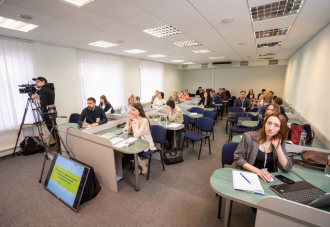Experts see four stages on the route of mentor-mentee cooperation: assessment of realities and potential, goal and path alignment, development of abilities and potential, and pauses for monitoring and adjustments.
The conditions of war are crisis circumstances, suddenly and inevitably affecting people and organizations. And when most tasks strategic for development begin to raise doubts – is it really possible to build relationships between mentors and mentees?
We have collected for you some practical cases and recommendations from mentors of the Mentorship Program 3.0. Therefore, we offer to look together at the peculiarities of implementing of each of the stages of mentoring in the context of war.
What should be paid attention to at the first stage – the stage of assessing the reality and potential of the mentee – Anastasiia Prokopenko (Access Point NGO), Anna Orlovska (Institute of Socio-Cultural Management NGO) and Natalia Seliukova (Ukrprostir NGO) shared their own experience.
What is the hardest thing about contacting with the mentee in the times of war?
Challenge one: First of all, the need for security should be met, without this it is difficult to move forward.
Anastasiia Prokopenko tells us: “The hardest thing about communicating and contacting in the first official status was that part of the team was in the territory where the hostilities were taking place, part of the team was gone. It was clear that the mentees were not ready to talk about anything now, not ready to plan any activities until they had addressed their problems. Some had issues with accommodation, some had other problems, some lost contact with their family members and did not know where they were. Once these issues were resolved, communication became more systematic and productive.“
Natalia Seliukova adds about the mentee organization which she is working with: “The biggest problem we’ve had since the beginning of communication was that the representatives of the organization went their separate ways. Some stayed put, some left for the west of Ukraine, some went abroad. And it turned out that there was a somewhat different understanding of what is needed in general today and where to move forward.”
Challenge two: The life in communities in the conditions of war changes its rhythm, and plans are affected by large and small external circumstances.
Anna Orlovska shares the case study of her mentees: “The biggest difficulty was in understanding the goals: Will we continue to advocate for the introduction of the DSTU (State Standards of Ukraine) for the bureau desks at the national level, or will we focus on something more relevant in the conditions of war. In fact, the experiment with the introduction of bureau desks, which was ongoing in Lviv, had to be stopped because the schools were closed, everyone switched to online learning. And whether this format of online learning will continue starting in September 1, whether we will return to offline learning – we don’t know.”
Challenge three: Young organizations with few active members find it difficult to distribute urgent work in a crisis
Anna Orlovska says: “There are two people actively participating in the advocacy campaign in the mentee team. Bohdan is engaged in volunteering, for the first month and a half he was constantly behind the wheel, bringing humanitarian aid to Lviv. Tetiana also had urgent tasks at her main job, and this led to a dramatic drop in her resources and productivity. With the start of a full-scale war, the focus shifted a lot and it was difficult to pay enough attention to the goals of their organization. But now the situation has improved, there is more stability now.”
Challenge four: Lack of a unified vision for organizational development and a cohesive team
Natalia Seliukova talks about her own observations: “There were joint activities, but there was no team as such. During the war, each of them began to gravitate towards the area that is closer based on their main line of activity and their own interests. In doing so, we were navigating between different activities for a long time: We were working either with IDPs, or with local people, or we were providing psychological help, or something else. And as such, the Foundation (organization) generally remained on the sidelines, because everyone focused on their own goal, their own activity. That is why it was necessary to put a lot of effort in order for the members of the organization to see first of all the Foundation, to read its articles of association, to understand in general what they were planning and where they were moving. After we came to a conclusion through which resources we can make it possible for the Foundation to work, at whose expense we can replenish it, only then did we stop at business support.”
What are the mentor’s skills and abilities that help mentee organizations stabilize and focus on the work in crisis?
To build successful cooperation, mentors may need developed skills to think structurally, set goals and remain resilient.
For example, Anna Orlovska tells about the fact that she constantly drew the mentee’s attention to the purpose of this or that activity: “For example, they say: “We want to cooperate with an online school, we’re going to do a presentation.” I say: “What’s the purpose of this presentation and the partnership as a whole?” I think it was at that point that the mentees started thinking: they remembered the goals of the organization, their strategic plan. Maybe it goes beyond advocacy, but being able to think about the strategic goals of the organization to further build a work plan is, I think, the most important thing they learned during that time.”
Olena Matviichuk, Mentorship Program 3.0 coordinator and organizational development expert, adds: “There is a concept of a stable adult in the growth theory. That is, it means that there is a stable person in teams and organizations. For example, teams can emotionally and psychologically ‘hit’ or ‘assault’ this person (mostly leaders) – but the person remains the same: focused and structured. And in fact, various dynamic processes do not affect them. In fact, it’s about the backbone. This is how we gain new and important experience for our growth.”
Facilitation skills can play an important role.
According to Nataliia Seliukova, in her case we could have gone the other way: We could have said that, say, there are articles of association, there are the goals of the organization, there is a place which we should move to, so we will move in that direction.
“But there were no hints on my part as to what to do,” says Ms Nataliia. “I tried to follow the path that the mentees have to get to what they need on their own.”
Olena Matviichuk adds: “It’s important to stay in constant contact with the mentees and give them space to grow up. That is, they needed to reach a decision on their own. And at the same time we needed to stay in contact with them and withstand almost all their maturation processes (thoughts, ideas, plans).”
Personal expertise of mentors and ability to pass on experience also matters. For example, this became important for Nataliia Seliukova: “We had a chosen gender direction, and we had to work more on it. But as it turned out in the process, the understanding of gender is quite superficial, and there is a certain stereotypical idea of just “counting men and women”, and it is unclear why all this is done and how it can be applied. That is, we started with a certain structured training: a breakdown of different situations and how gender approach is applied, how it can be used.”
In addition, in the process of cooperation with mentees, mentors and mentees will be helped by the skills of focusing on really important things.
Anastasiia Prokopenko talks about this: “Mentees wanted to do absolutely everything. From teaching local authorities how to work and communicate, to handing out humanitarian aid. And my job was to somehow help them focus smoothly and gently, to bring them to the point that we should focus on a certain topic, that we should talk about advocacy, about the final product, not just about wanting to improve life in the community we are in.”
According to Ms. Anastasiia, the problem was about shaping the right focus: “The mentees were saying the right things, but our job was to help them in the huge range of what they wanted to do, to see that string that you could grab onto and untangle that knot to come up with something that fits our program objectives and that can be accomplished in the environment which we find ourselves in now.”
Three tips that can help you in the first stage of mentoring
- Listen more, agree, avoid the urge to push or speed up the process If possible, listen to everyone individually, everybody together, find out how the mentees see their activities, and then discuss everything together.
- Find the time and opportunity for a personal offline meeting with the representatives of the mentee organization. This will allow you to learn more about the team, better understand the pitfalls of the NGO’s work, and create a better portrait of the representatives as individuals.
- Whenever possible, the whole team of the mentee organization was involved. In the context of war, when the NGO representatives end up in different places, communication can boil down to one person, because others are not ready to get involved. Therefore, if constant and systematic communication is established in advance, then in a crisis there is a better chance that the mentee team will maintain better communication.
Mentorship Program 3.0 to strengthen the advocacy and other capacities of civil society organizations from different parts of Ukraine is part of the Project Ukraine Civil Society Sectoral Support Activity implemented by the Initiative Center to Support Social Action “Ednannia” in partnership with the Ukrainian Center for Independent Political Research (UCIPR) and Centre for Democracy and Rule of Law (CEDEM) with the sincere support of the American people through United States Agency for International Development.



